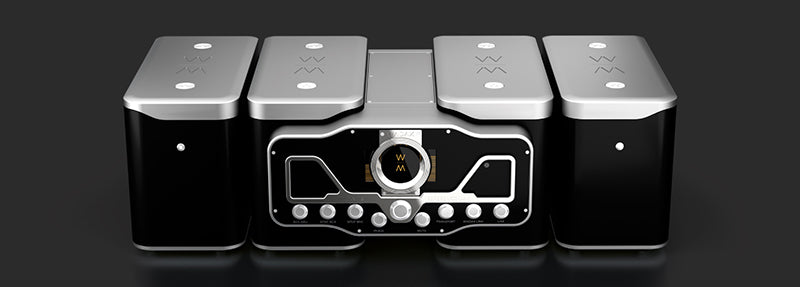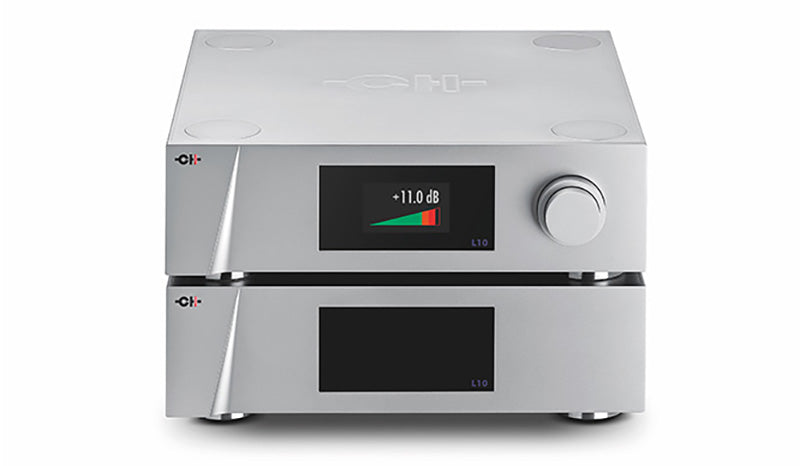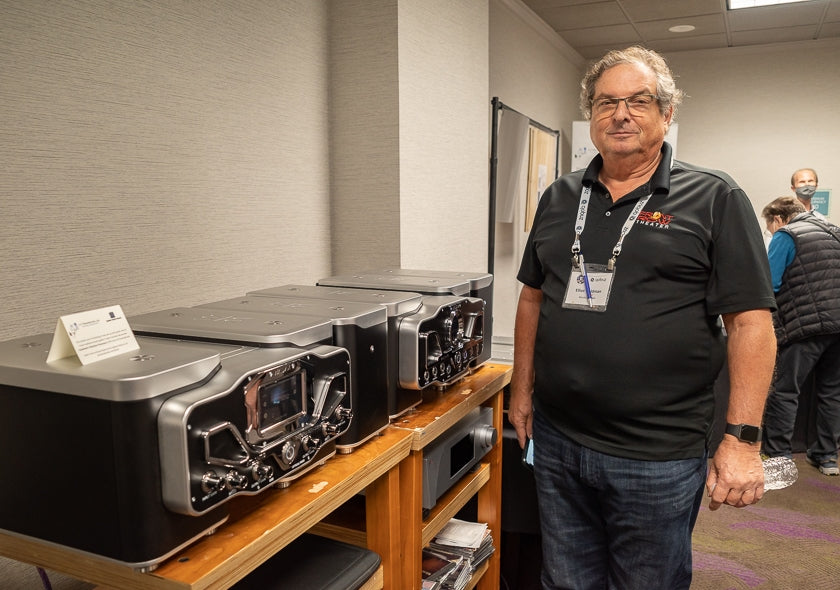Elliot Goldman is a partner in Bending Wave USA, distributor of Göbel loudspeakers, Wadax digital electronics, CH Precision electronics and other ultra-high-end products. He’s been in audio retailing and distribution for decades. Part One of our interview appeared in Issue 175.
FD: Digital playback software and hardware’s gotten so much better. I mean, I have a Cambridge DacMagic 100 that retails for $249 and it sounds great. When CDs first came out the playback didn’t sound great.
EG: I think the greatest invention that’s ever happened, particularly today, [is the] ability to stream. I’ve talked to all my customers about this. I’m not putting down records or tape or anything else. Play whatever you want to play. I am not a collector. I used to have 6,000 albums and found it to be a colossal pain in the ass. (laughs) Every time I wanted to [hear] something, I had to go find the record, clean the record, and clean the stylus…I am a very stream of consciousness listener. Sometimes I just want to hear a song or two. Now, for 15 or 20 bucks a month, I have pretty much every album ever recorded at my fingertips. And, being an older guy now, I value my time that I get to listen. To get my ear going and to explore new music. That exploration of new music brings me a lot of joy.
It’s very frustrating when I go to audio shows to see that so many people just listen to the same records over and over and over again. Which makes me sad, because I think they’re really spending too much time listening to the equipment and missing the point. I don’t consider myself an audiophile. I’m a music lover. I’m not saying I don’t enjoy the equipment, but the days of me spending days comparing one piece to another piece to another piece are long gone.
FD: Getting back to the Wadax gear. Review after review has high praise for the products.
EG: Wadax changes my viewpoint of what’s possible in the digital domain. Is it for everybody? Of course not. Is it expensive? Of course it is. Okay. But it shows you what the technology is capable of. And this rush of technology is really what the high-end audio business has always been about. Advancing the technology makes everything better long-term, from the early days of Linn trying to improve its turntable, or Audio Research or Conrad-Johnson or CH Precision or Mark Levinson or Wilson or Magico. All of these companies are trying to make their products better. [And] nobody puts a gun to your head to make you wanna buy it. Nobody’s telling you what you own before is junk. Technology keeps going on.

Wadax Atlantis Reference DAC.
[Today] you can park your ass in a chair and stream anything. I’m a big Roon lover too: it “learns” what you like and presents it to you. Qobuz does this too, and this has dramatically expanded my love of what I do and my knowledge and enjoyment of music because I’ve found so many things that I didn’t know [about before]. For example, Guy Clark. I can’t believe that I didn’t know who Guy Clark was. I would’ve never come across him in a record store.
FD: Yeah. I think streaming audio is one of the greatest things to ever happen, aside from the issue of payment to the artists.
EG: I can’t say anything [about artist compensation] because I’m not in that business. I certainly hope that artists earn what they deserve to earn.
I think that in order to really appreciate what [high-end audio is] capable of, we need to present people with the experience. It’s not just about picking a bunch of boxes and throwing them together. Because I don’t think that’s really how it works. And I think that’s why many people who [put a system together that way] are unhappy.
FD: What do you think the future of high-end audio retailing is? For decades we’ve been listening to people wringing their hands about a shrinking customer base and that we’re becoming irrelevant.
EG: The audio business is generally an undercapitalized industry. And for 50 years, very little marketing has been done. And I don’t understand that. The audio industry has not for the most part used the technology and the tools that are available to [enable a business to] grow. Companies seem to be very insulated and have great difficulty doing things cooperatively to expand the customer base. There are YouTubers that have 20, 30 million viewers [who are talking about products that are far less interesting and far less diverse than our business.
FD: Well, Steve Guttenberg (The Audiophiliac) is doing a nice job, to name one example.
EG: Well, I said for the most part.
We haven’t done [the] job at all of addressing the luxury market and putting our products in front of people that buy $100,000 dollar kitchens – and don’t cook. They buy Steinway pianos to put in their house and don’t play. They buy all kinds of things because they’re the best, but that’s not true [with] audio. Okay. The audio brands that people know are Bose and Sony and, maybe the most high-end [kind of products they might be aware of] are Bang & Olufsen or McIntosh.
But these [luxury] customers are buying stuff. And we have this whole custom-installation industry. But they [need to sell the] experience. Having been a retailer who has had multiple high-end showrooms over my career, it’s amazing to see people’s faces when they drive up in their high-end car, and they, they live in their high-end house, but had no idea that any of the brands that we’re talking about even existed. And that they could get this kind of experience in their home.
High-end audio is an experience, and learning to listen is a learned skill, just like learning to appreciate wine. I’m sure you remember your first great meal or bottle of wine and it’s something you need to be exposed to. If nobody ever took you to a [great] restaurant, you would have no idea what’s possible. There are good audio retailers around the country, but not as many as before, and not nearly as many that are trying to provide that service rather than just having large selections of brands that people can pick out and, get a discount, and take a box home.
If I had the available capital, I’d like to have four or five Göbel “experience centers” around the US. I think these “experience centers” have to happen.
And it’s really hard to break into the market today because there are some brands that are very well-established and believe me, I understand this as a speaker manufacturer. {If I want] to get my product in a lot of stores, they already have giant commitments to other brands. For me to put a speaker in there that’s going to compete with those brands, perhaps [sound] better than those brands, really doesn’t make sense for the dealer. Why would you want to invest multiple thousands or hundreds of thousands of dollars to put something on your floor that probably is just gonna divide your sales? It’s really not going to increase your sales.

Göbel Divin Majestic loudspeakers.
FD: When I was at AXPONA, I was struck by the number of $100,000 and up speaker systems.
EG: Go to the Munich HIGH END show – there’s are multiple floors of seven-figure systems on display.
FD: So, somebody’s buying the stuff.
EG: I hope to have more dealers now that COVID [restrictions] are over. When people hear our speakers, they buy them. It’s just, again, providing that experience is a difficult thing for a small company, which is me.
FD: You’re segueing right into the questions I inevitably have to ask people, which is how COVID has affected their business.
EG: COVID certainly didn’t help mine. Right at the beginning of COVID we had plans to [go to audio shows]. We got a really good review of the Göbel Divin Marquis from Stereophile, and we had people interested. And then you had two years of stores being closed. [Since we were a relatively new company, potential customers] didn’t have time to be exposed to the product and develop interest. Knock on wood, we survived. Our clients supported us and bought things from us. But we kind of contracted into survival mode.
FD: As we know, some businesses were helped by the pandemic. Well, knock on wood, it’ll get better for everybody.
EG: CH Precision has become a bigger brand. [I feel that] WADAX is the preeminent digital product on the planet, and we’re selling them. We’re selling Göbel speakers as well. I just want to do more. My plan is to be traveling and supporting dealers and doing shows and growing the [Göbel] brand in the US because I think it deserves to be heard.
Being a distributor in the US is very different than being a distributor in France or Spain or Denmark. It’s like having [to deal with] 50 countries.

CH Precision L10 preamplifier.
FD: Let’s shift gears. Tell us about Elliot’s List, the playlist that’s available on the Bending Wave USA website.
EG: I started doing that because customers are always asking me about the music I play when I do shows. I refuse to play the same dozen [“audiophile-approved”] tracks.
FD: Like “Tin Pan Alley” by Stevie Ray Vaughan.
EG: Stevie Ray’s a great artist and so are some of the others, but there’s millions of pieces of music, so, I started to put then up [on Elliot’s list. To be honest, I, I apologize for not continuing with it. I just got busy and, and, whatever. People written me really nice letters thanking me for just making them aware of some stuff that I like and most of which is good-sounding on a good system. Some are obviously better than others [in sound quality] but I think all the music is interesting. I’ve been getting into and learning more about classical and jazz. [It’s like going] back to my listening to music with Harry Pearson (former editor of The Absolute Sound – Ed.] – he was a big classical music person and knew a lot about it.
If you go back and read the early magazines, he was exploring and taking you on his journey. A lot of that has been corrupted. There seems to be a reviewer for everything and everyone. A lot of people don’t realize what they don’t know. I’m not referring just to reviewers, but the audio community as a whole. I mean, I’ve been doing this 50-something years and I’m still learning every day.
In audio, like everything else, there are different skill sets. Having the ability to manufacture a speaker doesn’t mean that you’re a world-class setup artist. [Regarding audio shows], I challenge anybody to take a million dollars’ worth of gear, put it in the truck, travel eight or 10 hours, unload the truck, unpack everything in a strange room, and in four or five hours, make it sound like a mature state-of-the-art system that you’ve had in your house for two years. This is not an easy thing to do. We do the best we can.
FD: That brings up another point, the prevalence of know-it-alls. The internet is such an enabler of people who are so quick to put somebody down. For example, the viewpoint that cables don’t make a difference. And if you think they do, you’re a fraud. You’re an idiot. You’re bought off. I mean, who needs any of that?
EG: The internet does a lot of good and it does a lot of bad. The trollers want to go and make their 15 minutes of fame on the internet, by trashing manufacturers, by trashing distributors and dealers, by saying horrible things about their gear at a show, things like that. I’m all for freedom of speech, but I think some people have lost the ability to understand [the credibility of] the voices [they’re] hearing.
Why aren’t more publications and manufacturers doing video? The best videos they could do would be educational. Show and teach people.
FD: Like you say, there’s so much more to learn. I was lucky when I got into the business. I was a neophyte and I knew nothing next to people like Arnie Nudell [Infinity] and Bill Johnson [Audio Research].
EG: Same thing for me. I remember going to a show and wanting to [become an] Audio Research [dealer] and I went up to Bill Johnson and felt like I was going to see the Wizard of Oz. (laughs) I was trembling and frightened and, and Bill was very kind to me. And yeah, I became a dealer.
FD: (laughs)
EG: I [became] good friends with Arnie and traveled to his place a bunch of times to listen to new stuff that he was doing. And that’s how the industry was. And now…I think it is a function of our society, Frank, that there are a lot of people who think the world didn’t exist before they were born. There are people who don’t want to learn from the past.
FD: I sometimes feel like I’m so old school, like I’m like the last of the old guard, but on the other hand, I’m not just gonna roll over and say, “Okay, that’s it. I’ve had it.”
EG: Those who refuse to learn history…
FD: …are doomed to repeat it.
EG: History is a great teacher and we have a tremendous amount of really qualified people out there.
EG: Let me say one more thing my father taught me. I think this is really important. He used to say, do your research on who you buy from before you decide what to buy. Because in most cases, they’re gonna know much more about what you are buying than you.
There’s an old expression in retail. Everybody wants the best product at the best price with the best service. Now choose two out of three. The customers that come and allow you to do your thing and buy a system and allow you to make [a living], those are the ones that you’re gonna break your chops for.
Header image courtesy of Harris Fogel.



